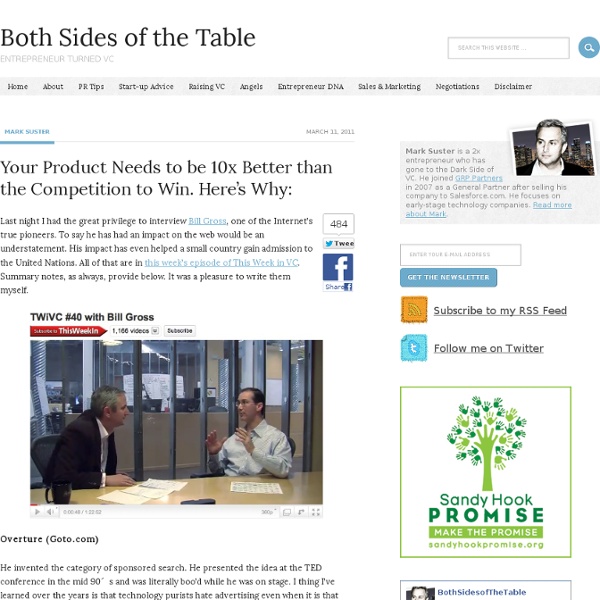Getting Your Startup Website Ready, Pre-Launch
Even if you’re not quite ready to show the public your product, you can still create a good website and a solid online presence for your startup. I want to sidestep the argument about whether or not it’s good to be “stealth” or not, and work with the assumption that if you’ve purchased the domain name, you’re going to put up some sort of website. So here are a few of the things you should consider when building your startup’s site: 1. You don’t have to commit to the whole graphical “look and feel” of your brand on day one, but you do want to to make moves in that direction. 2. Be sure to capture the email addresses of those who visit. Add these people to a newsletter. 3. Make sure you have all the various sharing buttons on your site so that people can follow you on Twitter, follow your RSS feeds, like your site, and easily share information with their friends about your sites. 4. Never underestimate the importance of having a blog. 5. 6. Enough about you.
New App Combines Personal & Business To-Do Lists
Apps that track tasks are a dime a dozen, and most business collaboration tools come equipped with a to-do list function. But when Andrew Wilkinson and his team at design consultancy Metalab sat down to build their ultimate task manager, Flow, they were shooting to bridge the gap between these two groups of productivity products. "The idea behind Flow is that you can bring your entire life into one place," Wilkinson says. "In the same place you remember your grocery list or the fact that you need to clip your toenails, you can also be collaborating with your team at work, you can be working on a home improvement project with your boyfriend." Flow, which launched Tuesday afternoon, is something like a cross between Cultured Code's Things App for Apple products and 37 Signal's Basecamp. Like Things, it allows users to create projects, schedule tasks and tag items for organization. The price tag for this service, which includes a free iPhone app, is $9.99 per month.
The seven tricks everyone can learn from game designers
Gamification, the practice of adding game-like mechanics to non-game applications to improve engagement, is going through a hype cycle. And one of its leading experts, Amy Jo Kim, added to the push by outlining seven core gamification tricks today at the Web 2.0 Expo in San Francisco. Kim, a veteran game designer and founder of the game studio Shufflebrain, said she wasn’t a fan of the word “gamification.” She prefers the word “game thinking” and believes that games are going to be everywhere, noting that game designer Will Wright refers to this time as a Gambrian Explosion, much like the Cambrian Explosion that gave birth to so many new life forms 500 million years ago. Kim said that some people describe gamification as a loyalty program on steroids; or using game techniques to turbo-charge products, services and apps; or taking a real world activity and turning it into a game. Here are the seven ideas explained: 1. 2. 3. 4. 5. 6. 7. Don't let cyber attacks kill your game!
Content Marketing in a Blink: The Content Grid v2 [Infographic] — It's All About Revenue
Last June, Eloqua published the first infographic on the then-nascent content marketing industry. We called it The Content Grid. The public seemed to like the visual. It earned six awards, sparked dozens of speaking engagements, and triggered a number of “how do you ____” calls from Fortune 500 companies. What a difference a year makes. Enter June 2011. A mature industry needs mature resources. The Content Grid v2 picks up where its predecessor left off. Enjoy The Content Grid v2. Click image for full size: If you want to embed The Content Grid v2 on your blog, be our guest.
Beautiful live chat software pricing for sales and support
In-browser Chat Our in-browser Olark chat makes connecting with your customer as easy as launching a browser! You can also connect using your favorite IM client. Targeted Chat Targeted chat lets you set rules to interact only with visitors who go to a specific page or behave in certain ways, so you can talk to the most important customers. CRM & Helpdesk Integrations Give your salespeople powerful information about customers and keep track of them over time with Olark live chat and your CRM. Customize Your Design Olark can match your design perfectly with customization features. Sophisticated Insights Along with an integration with Google Analytics, you can learn about customer and operator behavior and how to improve your business overall. Offline Messages Never miss a customer. Developer API In addition to the awesome features we continue to develop, we offer a useful API that allows you to trick out Olark even further. Cobrowsing
Pricing
Simple Installation No Commitment. Cancel any time. Customizable Graphics Complete Transparency Works on stores of any size Top notch customer service We're proud of our product and always willing to help. Our success depends on yours — you pay nothing until we increase your sales! Will Granify work on my store? Yes! How does pricing work after the trial? Granify is pay on performance — there's no charge unless we increase your revenue! Can I cancel my account at any time? Yes.



